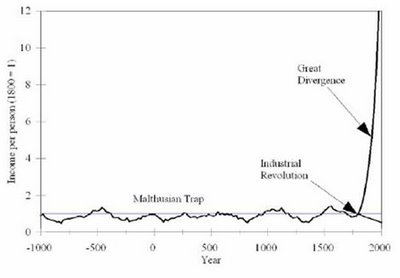
This is from Gregory Clark’s A Farewell to Alms: A Brief Economic History of the World (forthcoming in 2007 from Princeton). You can find some sample chapters, and lots of related papers, in his website at the Institute of Governmental Affairs at UC-Davis. Here’s an excerpt from the book’s intro:
The basic outline of world economic history is surprisingly
simple. Indeed it can be summarized in one diagram: figure 1.1 (see above).
Before 1800 income per person – the food, clothing, heat, light,
housing, and furnishings available per head - varied across societies
and epochs. But there was no upward trend. A simple but
powerful mechanism explained in this book, the Malthusian Trap,
kept incomes within a range narrow by modern standards.
Thus the average inhabitant in the world of 1800 was no better
off than the average person of 100,000 BC. Indeed, most
likely, consumption per person declined as we approached 1800.
The lucky denizens of wealthy societies such as eighteenth century
England or the Netherlands managed a material life style equivalent
to the Neolithic. But the vast swath of humanity in East and
South Asia, particularly in Japan and in China, eked out a living in
conditions that seem to have been significantly poorer than those
of cavemen.
(…)
The Industrial Revolution, a mere 200 years ago, changed
forever the possibilities for material comfort. Incomes per person
began a sustained growth in a favored group of countries around
1820. Now in the richest of the modern economies living standards
are 10-20 times better than was average in the world of
1800. Further the biggest beneficiary of the Industrial Revolution
has so far been the poor and the unskilled, not the typically
wealthy owners of land or capital, or the educated. Within the
rich economies of our world there is not only more for everyone,
but lots more for the bottom strata.

No comments:
Post a Comment